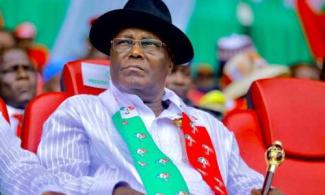The presidential candidate of the Peoples Democratic Party (PDP), Atiku Abubakar, has accused the Presidential Election Petition Court (PEPC) judges who affirmed the election of President Bola Tinubu, of exhibiting bias through uncomplimentary remarks while delivering the judgment.
Atiku, who is seeking an overturn of the PEPC judgment at the Supreme Court told the apex court that the tribunal judgment was flawed by the judges’ failure to take into cognisance the “Doctrine of Legitimate Expectation” regarding the failure of the Independent National Electoral Commission (INEC) to conduct the election in accordance with its own guidelines and the Electoral Act, 2022.
The doctrine of Legitimate Expectation was first developed in English law as a ground of judicial review in administrative law to protect a procedural or substantive interest when a public authority rescinds from a representation made to a person.
In Nigeria, the doctrine of legitimate expectation demands that a public authority shall respect and apply its stated position or sustained practice in exercising its powers on members of the public.
SaharaReporters gathered that Atiku in his Notice of Appeal dated September 18, and filed by his lead counsel, Chris Uche (SAN), submitted that the failure of the tribunal to apply the said doctrine is enough ground for the apex court to set aside the entire decision of the lower court.
Atiku, who filed a seven ground of his Notice of Appeal, submitted that, “The lower Court erred in Law when it failed to nullify the presidential election held on February 25, 2023 on the ground of noncompliance with the Electoral Act 2022, when by evidence before the Court, the 1st Respondent (INEC) conducted the election based on very grave and gross misrepresentation contrary to the principles of the Electoral Act 2022, based on the “doctrine of legitimate expectation”.
Pointing out that the Electoral Act, 2022, made the use of Bi-modal Verification Accreditation System (BVAS) and INEC’s Results Viewing (IReV) portals mandatory in the conduct of the 2023 general elections, the former Vice President added that INEC through its Chairman, Professor Yakubu Mahmood, publicly gave guarantees, undertakings, clear and unambiguous representations to candidates, political parties and Nigerians, that polling units results were mandatorily required to be electronically transmitted or transferred directly by the Presiding Officers.
He argued that, “There was no evidence before the lower Court that the 1st Respondent altered its aforesaid Guidelines and Regulations to remove the said requirement of electronic transmission of the results of the election directly from the polling units to the 1st Respondent’s Collation System”.
Atiku further submitted that INEC “Conducted the said Presidential Election based on the gross misrepresentation to the Appellants and the general voting public that the Presiding Officers were going to electronically transmit the results of the said election directly from the polling units to the 1st Respondent’s Collation System.
“Contrary to the above unambiguous representations, undertakings and guarantees, the 1st Respondent neither deployed the electronic transmission of election results nor the electronic collation system in the said election, sabotaging the raison d’etre for the enactment of the new Electoral Act 2022 and the introduction of the technological innovations.
“Rather than hold the 1st Respondent (INEC) as a public institution accountable to the representations that it made pursuant to its statutory and constitutional duties which created legitimate expectation on the part of the Appellant’s, the lower court wrongly exonerated the 1st Respondent of any responsibility by holding that the use of the technological innovations to guarantee transparency was not mandatory”.
According to him, the February 25 poll was “Conducted based on very grave and gross misrepresentation and was therefore oppressive to the Appellants and thus not free and fair, and not in accordance with the principles of the Electoral Act 2022, and not protected by the presumption of regularity, as well as the preamble and the fundamental objectives and directive principles of State Policy of the Constitution of the Federal Republic of Nigeria 1999 (as amended) adopted by the lower court.
“The grave misrepresentation negated the legal presumption of official regularity in favour of the 1st Respondent.”
He told the Supreme Court that INEC as a public institution is not above the law, and not entitled to breach its own regulations with impunity, after clear and unambiguous representations upon which parties have placed reliance and entitled to legitimate expectation.
He noted that “The said election ought to have been nullified by reason of the said gross misrepresentation by a public institution based upon the “doctrine of legitimate expectation” as applied by the Supreme Court as a policy Court….”
Atiku stated in grounds 34 that the “Lower Court erred in law in its use of disparaging words against the Appellants in its judgment evincing bias against the Appellants as Petitioners and thereby violating their right to fair hearing and occasioning grave miscarriage of justice.
“The justices in their verdicts, while discountenancing the arguments and contentions of the Appellants used expressions such as ‘ludicrous’ (page 721 of the judgment), ‘clever by half’ (page 557 of the judgment), ‘dishonourable practice’ (page 507 of the judgment), ‘smuggle’ (page 557), ‘fallacious’ (page 721 of the judgment); ‘foul play’ (page 560 of the judgment), ‘cross the line of misconception’ (page 644 of the judgment); ‘collect evidence from the market’ (page 765 of the judgment); ‘those who are not used to reading preambles’ (page 726 of the judgment); ‘hollowness in the argument of the Petitioners’ (page 727 of the judgment); etc.”
He held that the choice of words and expressions by the lower court shows the lower Court’s contempt and disdain for the Appellants, stressing that “The lower court failed to use civil, modest, moderate, and temperate language that is befitting of the exalted position of the court in line with the Revised Code for Judicial Officers of the Federal Republic of Nigeria, promulgated by the National Judicial Council.
“The words against the Appellants in the judgment evince a disposition in the mind of the lower court that was far from objective, which approach demonstrated bias and infringement to the Appellants’ right to fair hearing.
“The Appellants were entitled to approach the Court for the ventilation of their grievances, which court was set up as the Presidential Election Petition Court, solely to receive petitions arising from the presidential election.
“The right to present an election petition in respect of a presidential election is a right granted by the Constitution of the Federal Republic of Nigeria, 1999 (as amended) and the Electoral Act 2022, which right the Appellants merely exercised.
“The use of the said words and expressions substantially affected the lower court’s consideration of the Appellants’ case, peremptorily striking out their witness statements on oath, their exhibits, their pleadings, and discountenancing the evidence of their witnesses, and thus occasioned a grave miscarriage of justice.”








